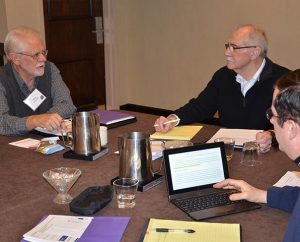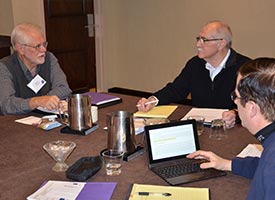By Joe Isenhower Jr.
ST. LOUIS — LCMS Specialized Pastoral Ministry (SPM) hosted two pivotal meetings for chaplains, pastoral counselors and clinical educators in late February that got high marks from participants.

One was a Feb. 17-18 gathering of 10 emergency services chaplains (ESC) who beta-tested a new process for such chaplains to qualify for ecclesiastical endorsement by the Synod.
The other was the first-ever SPM Regional Educational Event Feb. 24-26, which drew some 30 participants — to help them meet continuing-education requirements for ecclesiastical endorsement that went into effect last year for many of the rostered LCMS workers in ministries that SPM serves. Those rostered workers include institutional and emergency-services chaplains, clinical pastoral educators and pastoral counselors, along with Veterans Affairs (VA) and federal prison chaplains.
In addition to workers from those categories — who are required to maintain their ecclesiastical endorsement with 20 hours of SPM-related continuing education each year — the Regional Education Events are open to seminarians and deaconess students “who may be interested in exploring ministry in these specialized settings,” according to the Rev. Joel Hempel, manager of SPM, which is a part of the LCMS Office of National Mission, under LCMS Mercy Operations.
The Rev. John Fale, associate executive director of LCMS Mercy Operations, told Reporter that “more than 500 individuals are known to be engaged in specialized pastoral ministry” throughout the Synod.
Hempel explained in an email that “ecclesiastical-endorsement core standards [for specialized pastoral ministry in the Synod] were developed many years ago.” He added that the process tested by the 10 emergency-services chaplains “was developed by our SPM office along with an ESC task force created for the purpose of determining (a) what was needed as a minimum amount of training and experience before one presented himself/herself for endorsement, (b) the process for grandfathering someone into ESC-endorsed status and (c) the means for testing the endorsement process.”
Reasons for endorsement
Hempel indicated that ecclesiastical endorsement “is needed for multiple reasons: [to] give assurance to the church that chaplains are properly trained, solid in Lutheran theology and practice and are committed to the LCMS SPM Code of Ethics and to provide faithful and competent pastoral care.” He said endorsement also provides a “network of support, … peer and ecclesiastical accountability, recognition of the invaluable service provided in the name of our church … and appreciation for their faithful service.”
The 10 ESCs make up the first “class” for ESC endorsement, although one of them (the Rev. Dr. William Wagner of Beloit, Wis.) previously earned that endorsement some years ago, according to Hempel. He said that those 10, who volunteered to test the process, “will be endorsed because we invited only those who have a proven and extended track record of competent service in ESC.”
Wagner, who is retired, serves as vacancy pastor at Gloria Dei Lutheran Church in Lake Geneva, Wis., disaster-response coordinator for the LCMS South Wisconsin District and chaplain for the Wisconsin Association of Fire Chiefs. In addition, he is an approved instructor for chaplains with several groups.
Also the volunteer chaplain for the Beloit police and fire departments, Wagner says that “perhaps [my] most performed task is that of making death notifications.”
“Hopefully, the endorsement process will encourage more Lutherans to engage in ESC and agencies to recognize the high standards to which we hold our chaplains,” he indicated via email.
Wagner wrote that in relation to his current ministry, “I found the review of the process beneficial in that it gave me insights into my everyday activities.”
The Rev. Ronald T. Norris of Gig Harbor, Wash., also is a disaster-response coordinator, for the LCMS Northwest District, and is volunteer chaplain for the Pierce County Sheriff’s Department. Like Wagner, among his chaplain duties he delivers “death notifications to families,” which he terms “one of the most challenging and heart-wrenching tasks.”
‘Chaplaincy … Gospel-driven’
Norris also indicated that participation in the ecclesiastical-endorsement process “provided an opportunity to examine myself regarding my years as an emergency-services chaplain. Years of service can take their toll on the individual after responding to incident after incident. Passion can wane. As I listened to others and to myself, I was reminded of why I serve and whom I serve. This form of chaplaincy is Gospel-driven, to reach out to all peoples with the love of God.”
Norris continued that he at first found the ESC endorsement process “intimidating [with] the volume and variety of documents we were asked to prepare. [But] as we moved from paper to personal interview, it became a time of discovery. It also impressed upon me our Synod’s seriousness in evaluating prospective emergency-services chaplains and its high regard for the work we do.”
“It was a privilege to be asked to participate in this ecclesiastical-endorsement test process.”
Hempel indicated that as many as three SPM Regional Educational Events will be planned each year. “The events are free,” he said, “thanks to the generosity of our LCMS members’ gifts to Synod.” Participants cover their own travel expenses.
The Feb. 24-26 event at a retreat center in St. Louis included worship, devotions and Bible study, as well as a number of presentations and panel sessions, small-group discussions and opportunities for feedback.
Major presentation topics and presenters for the first event were “Pastoral Care in a Pluralistic Context,” with the Rev. Dr. Philip Kuehnert of Williamsburg, Va., and “Personal and Professional Wellness in SPM,” with the Rev. Leroy “Lee” Joesten, Park Ridge, Ill. The Bible study leader was Rev. Russell Helbig of Summerville, S.C.
Peer review and a workshop by Hempel titled “Essential Elements of a Pastoral Care Relationship Refresher” also were offered as “post-SPM-event opportunities.”
Benefits of regional events
Hempel said that in addition to offering continuing-education credit, the regional events “also [will] bring together those who are faced with similar challenges and joys in ministry so there can be peer support, sharing of best practices, spiritual renewal and retreating from the stress of ministry.”
“When laypeople have to go to the hospital or … hospice or a loved one is in prison or struggling in a VA hospital trying desperately to come back home from the horrors of war, and they are graced to have an LCMS-trained SPM attend to them, they will experience the difference,” Hempel wrote. “Like everyone else, SPMs are more effective in their service to others when they themselves have been built up, renewed and have been given the time away to continue growing and learning.”
Hempel said that in 20 evaluations received from participants of the first regional educational event, “the vast majority were very encouraging, rating the program and different elements in the 4.5 range,” with 5 being the highest possible score.
Participants in the regional event also gave it high ratings via email messages to Reporter, which asked them to address what was of most value to them in its “fellowship aspect” with LCMS chaplains and others.
“It is a rare opportunity that LCMS SPM folks get together for any reason, and especially as it pertains to our specialized ministry settings,” wrote the Rev. Jeffery Scheer, administrator for Clinical Pastoral Education for Lutheran Senior Services (LSS) in St. Louis. “It was very affirming that my church body enabled, funded and coordinated this event.
“For me,” Scheer continued, “since I often get more than the 20 hours of [required] continuing education a year, … the fellowship with colleagues in specialized ministry was more important.”
He stated that “this conference also helped me to feel legitimized for my ministry within the LCMS.”
“I found the conference to be one of hope and encouragement that SPM folks are seen as valuable and important resources for the church,” Scheer wrote. Noting that he has “always” found such hope and encouragement from the LCMS SPM office and its personnel, he wrote that “I felt this particularly at this conference from the larger church.”
A second-year deaconess student at Concordia Seminary, St. Louis, Kate Hokana told Reporter “I’ve wanted to go into hospital ministry ever since high school.” Her current fieldwork is with LSS and she says she hopes that her internship is “in an SPM context.”
Hokana said she found the SPM event “a positive experience, both for myself and the others. There was a lot of good information to be discussed about the pluralistic society we live in. I enjoyed all the [presentations and] the interaction of the attendees. … There were some good relationships built.” She said she also appreciated “the opportunity of learning more about the challenges of SPM.”
A ‘wonderful experience’
Hokana said the event was a “wonderful experience. I look forward to attending more [of them] … hopefully one day as a chaplain.”
The Rev. Derek Wolter is chaplain for Palliative and Hospice Care for the Veterans Affairs St. Louis Health Care System.
“The SPM conference gave chaplains, clinical pastoral education supervisors and pastoral counselors a visible community and a sense of shared experience,” Wolter wrote. “For me, the relationship building that took place over the three days was the best part. We met in small groups, with four or five other SPMs, to share thoughts, goals, frustrations and challenges connected with a ministry to those on the edges of our society. It was a beginning of a process of establishing fellowship and awareness in the SPM community. I came away from the SPM conference with a sense of community in ministry and mutual support that I have not felt since leaving parish ministry in 2001.”
“It was an opportunity to gather with other SPMs and celebrate the work we do and to begin to give ourselves an identity within the LCMS,” Wolter added.
A member of the Synod’s SMP advisory committee, Wolter wrote that the event “was our beta-test and I was very pleased with it, both on a personal level and as a member of the [committee]. I would encourage other SPMs to attend the next one we have scheduled. You will come away encouraged, refreshed and supported in the work you do.”
The next SPM Regional Education Event is scheduled for Oct. 28-30 in St. Louis. Hempel said that the planning committee for the events also is preparing to “host [them] in other regions of the country where SPMs are clustered.”
To contact LCMS Specialized Pastoral Ministry, email spm@lcms.org or call 314-996-1388. For more information about that ministry, visit lcms.org/specializedpastoralministry.
